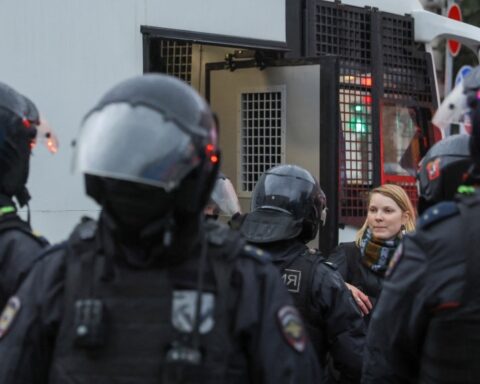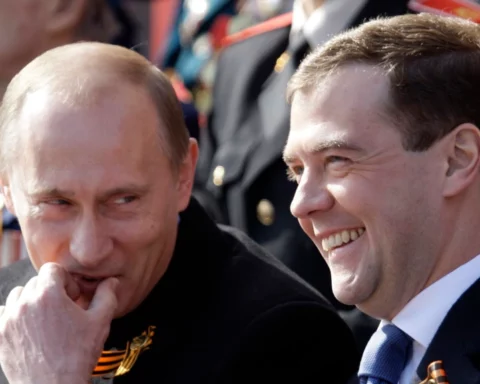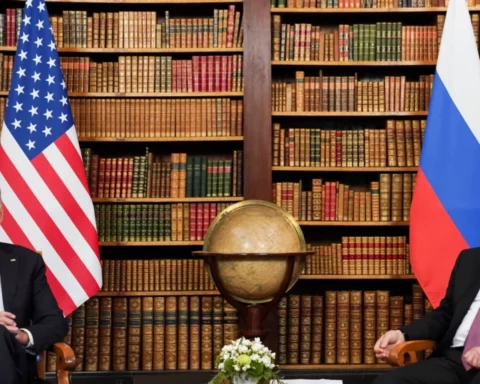There are few things held more sacred by the Russian state than the Soviet Union’s role in the defeat of Nazi Germany in World War II, and the conflict that killed an estimated 27 million Soviet citizens still reverberates across Russia. Few families, if any, were left untouched.
So when the popular rapper Morgenshtern said that President Vladimir Putin’s government spends far too much money on annual Victory Day celebrations — the Red Square military parade and other ceremonies held on May 9, which Russia marks as the anniversary of the Nazi surrender — his remarks did not go unnoticed. And he may face prosecution.
“I really don’t understand this celebration of a victory that happened, what, 76 years ago…. Every year we spend millions on it,” the 23-year-old rapper, known as much for his hit tracks Ice and Cadillac as his heavily tattooed face, said in an interview with celebrity TV host and former presidential candidate Kseniya Sobchak that was posted to her YouTube channel on October 25.
“I guess there’s nothing [else] to be proud of. Maybe that’s why,” Morgenshtern said, seemingly thinking out loud about the government’s motives for mounting the massive annual celebrations, which have been stepped up since Putin came to power over two decades ago.
“But to reminisce every year, for almost a century, about how we once won — I don’t know,” he said, adding a mildly uncouth interjection into his remarks several times. “I don’t understand it, to be honest.”
Pressed by Sobchak what victory in what Russia calls the Great Patriotic War means to him personally, the rapper replied that it was “cool — good going! But move further, achieve more victories — victories in information technology, victories in space technology — and celebrate them. But no, we’re still only celebrating what happened 70-some years ago.”
The exchange began when Sobchak, sitting on the floor with Morgenshtern for the interview, asked what he makes of artists who appear in World War II-themed music videos funded by the state. He threw up his hands and said he doesn’t understand the fuss over Victory Day, which surveys show is one of the two most popular public holidays in Russia, alongside New Year’s Eve. The clip of the interview has since been viewed more than 2 million times.
The memory of World War II and those who died, at the front or elsewhere, remains immensely important to millions of Russians, but Putin’s critics accuse him of using the proudest moment in a troubled century as a political crutch decades later.
Others, however, are critical of anyone they see as questioning the honor of the dead or the Soviet Union’s role in the Allied victory.
The movement Veterans Of Russia soon issued a statement saying that it would be appealing to prosecutors to investigate Morgenshtern’s words for “denigration of historical memory and legacy.” Hours later, federal Investigative Committee chief Aleksandr Bastrykin issued an order for Morgenshtern’s remarks to be checked to see if they violated the law.
Since Putin’s return for a third presidential term in 2012, Russia has passed a flurry of laws regulating statements that can be deemed to offend certain minorities or undermine certain historical episodes feted by the state. Russia’s newly revised constitution also bans any attempt to belittle Russia’s military victories.
It was no surprise, then, that the controversy over Morgenshtern’s comments reached the administration of Putin, who frequently uses public forums to talk about the Soviet Union’s role in World War II as he sees it — and sometimes to threaten European governments with consequences if they question Moscow’s narrative.
Speaking to reporters on October 26, Kremlin spokesman Dmitry Peskov said that Morgenshtern was likely speaking “not out of malice but out of ignorance,” but added that he should take “moral responsibility” for his statements.
“Young people who are famous and popular among their peers should grasp that in some way or another they have a duty to understand such nationally important concepts as Victory Day,” he said.
On October 26, with the controversy showing no signs of abating, Morgenshtern took to his Instagram account to issue a public apology for his words.
In a Stories post to his 7.7 million followers, he said he was simply making “an honest admission” to the effect that he doesn’t understand Victory Day, and claimed that his words were taken out of context as a result of the way the video interview was edited.
He said that he had actually gone on to argue that Russia’s World War II veterans — many of whom live in poverty — should be given greater subsidies by the government.
“I respect and am proud of veterans, but, unfortunately, I don’t correctly formulate my thoughts,” he said.
“I want to apologize to all those who were offended by my words about Victory Day. I in no way meant to belittle the importance of this event,” he wrote, going on to accuse unspecified media outlets of distorting his words “for their own dirty purposes.“
It’s also not Morgenshtern’s first controversial incident.
In June, the rapper was fined 100,000 rubles ($1,435) on charges of promoting drug use in video clips for his songs Rozovoye Vino 2 and Family. And in May, prosecutors launched a probe after complaints that he had offended religious feelings in his track New Wave.






